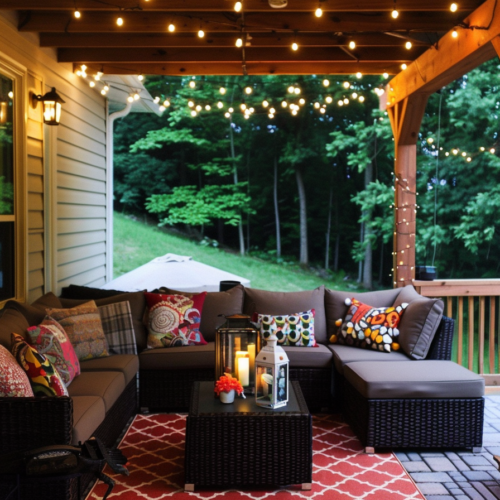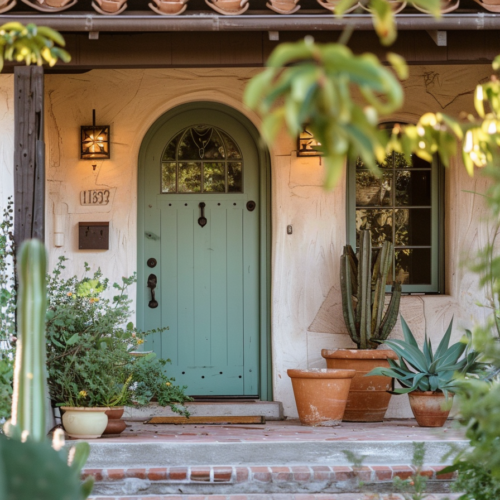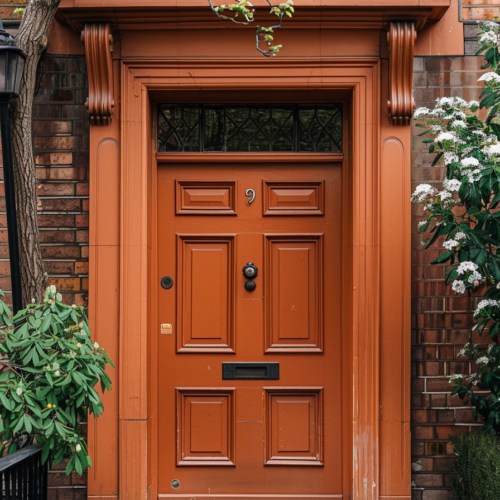Looking for a way to bring more calm and happiness into your home to enhance the quality of your life? Then follow these feng shui living room tips!
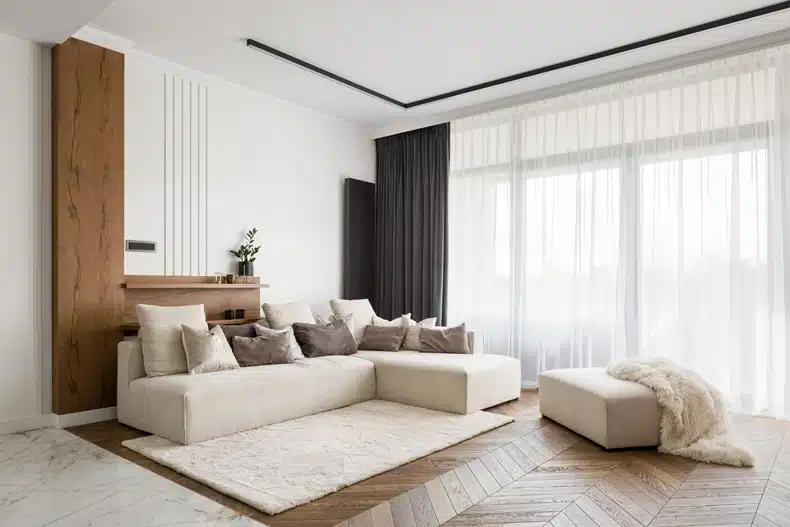
By harnessing the ancient wisdom of feng shui, your living room will feel more welcoming. You’ll create a better energy flow through your home and make it a place you’ll love to be!
Your living room is one of the most important rooms in your home for you and your family. It’s a space for relaxing but also socializing and hosting guests. People have been using feng shui to improve their homes for thousands of years. With a few simple tips, you can too!
Here’s everything you need to know to create a feng shui living room!
A Quick Introduction to Feng Shui – What is Feng Shui?
You’ve probably heard of feng shui, but you may not know exactly what it is. So, here’s a quick introduction to bring you up to speed.
Feng shui is an ancient Chinese art and philosophy of interior design. It aims to create balance and allow energy to flow freely through buildings and elements. As a result, you can optimize your health, wealth, and fortune. But it also makes rooms feel comfortable, practical, and
Feng shui teaches us how to arrange furniture and rooms to balance the yin and yang in the home. If you can do this, you’ll create a healthy energy flow, also known as ‘chi’.
The name itself reflects this search for harmony and positive energy flow. Feng means wind, while shui translates to water. By following feng shui, you’ll create balance and harmony within your home.
There are feng shui rules for each main room of your home. For example, a feng shui bedroom should be a calming, tranquil space. But a living room is a more social and energetic part of the house.
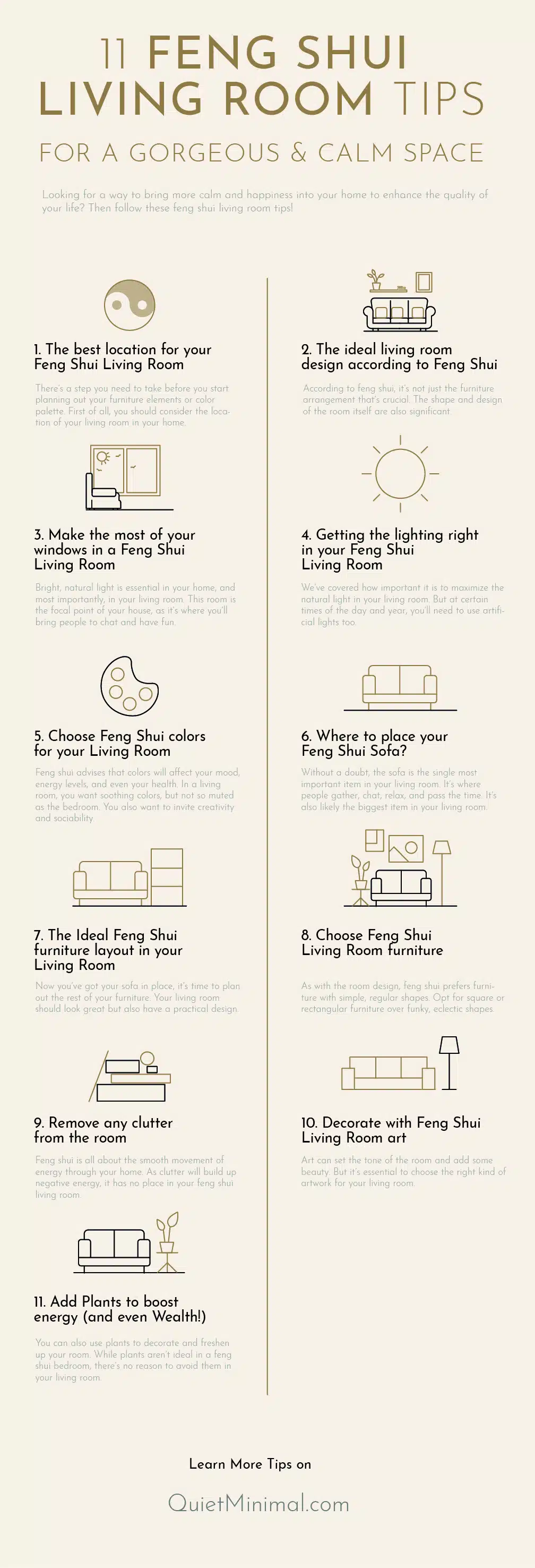
Read on to find out how to create the perfect feng shui living room.
11 Simple Tips for How to Feng Shui Your Living Room
1. The best location for your Feng Shui Living Room
There’s a step you need to take before you start planning out your furniture elements or color palette. First of all, you should consider the location of your living room in your home.
As the living room is a space for entertaining, it’s best to have it near the front of the house.
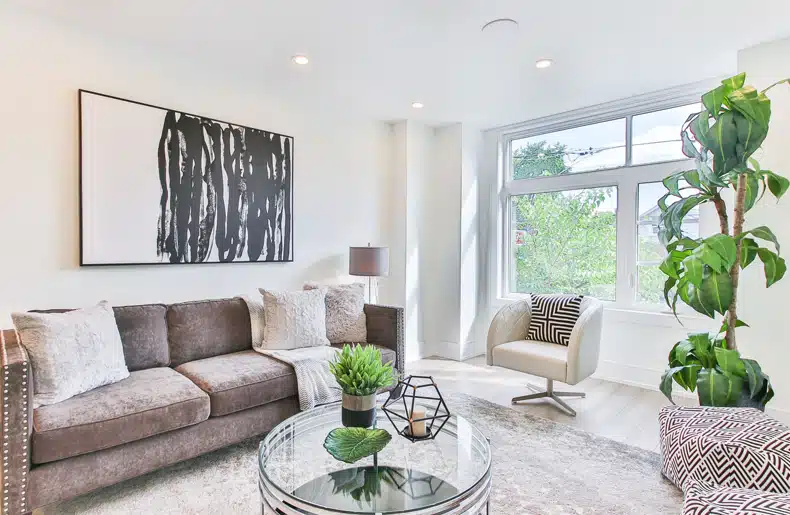
Ideally, it should be the first room you enter when you come into the house. That means visitors won’t need to walk through more private areas to reach the living room. This positioning will prevent any discomfort, so guests feel welcome in your home.
2. The ideal living room design according to Feng Shui
According to feng shui, it’s not just the furniture arrangement that’s crucial. The shape and design of the room itself are also significant.
A square or rectangular room is perfect, as it will prevent any bad energy from collecting. Avoid any awkward alcoves where negative energy can get stuck.
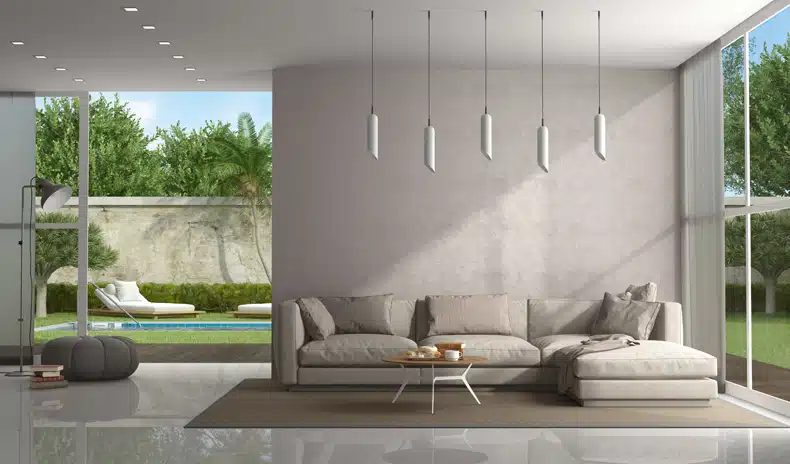
It’s also preferable to go for a living room with a high ceiling. That allows energy to move more freely with a healthy flow through the home.
In contrast, a low ceiling can make the room feel cramped and a bit oppressive. You may not realize it, but it could be the reason you feel anxious or unable to relax.
While a slanted ceiling can look interesting, it’s also not ideal when it comes to feng shui. It will feel like the ceiling is pushing down on you and applying pressure.
An open-plan room will feel spacious and allow for air and energy to flow through your home.
It all comes back to feeling safe. When you can see all the corners of the room, you know that there are no intruders in your home. Although this is unlikely, it’s still built into our DNA to be on the alert for any danger.
For this reason, you should also avoid pillars in your living room. They make handy places to hide, which makes the subconscious brain feel uneasy. Plus, according to feng shui, they can harbor bad energy.
If you’re buying a new home, keep this in mind when looking around. I would recommend going for a living room with a regular shape and a high ceiling.
Not only will it prevent any bad energy from collecting, but it lets in lots of natural light. The result is that you’ll feel relaxed and at ease (and so will your guests!).
You may not be able to redesign the shape of your living room for a few different reasons. But there are a few tricks you can use to make the most of your space. For example, if the room has a nook or alcove, you can fill it with a cabinet or furniture.
Avoid placing seating areas in an alcove, as you don’t want to spend too much time in any space that could hold bad energy. If you have a loft room or slanted ceiling, place the seating area at the highest point.
You don’t need to redesign your home entirely; you can make the best of the elements you have.
3. Make the most of your windows in a Feng Shui Living Room
Bright, natural light is essential in your home, and most importantly, in your living room.
This room is the focal point of your house, as it’s where you’ll bring people to chat and have fun. So, it should feel bright and full of energy!
The bigger the windows, the better. Glass doors also do the trick, as they flood your room with beautiful sunlight. The ancient Chinese belief is that a bright room with large windows will make you more sociable!

So, give it a try. Make sure that your furniture isn’t blocking any natural light. Use light, airy curtains that will let as much light in as possible.
Throw those windows open when the weather’s right for it. That will allow as much fresh air and energy to move through your home as possible.
4. Getting the lighting right in your Feng Shui Living Room
We’ve covered how important it is to maximize the natural light in your living room. But at certain times of the day and year, you’ll need to use artificial lights too.
In the evening and through winter, artificial lights are vital to brighten your space. A dark, gloomy room will make you feel sluggish and lacking in energy.
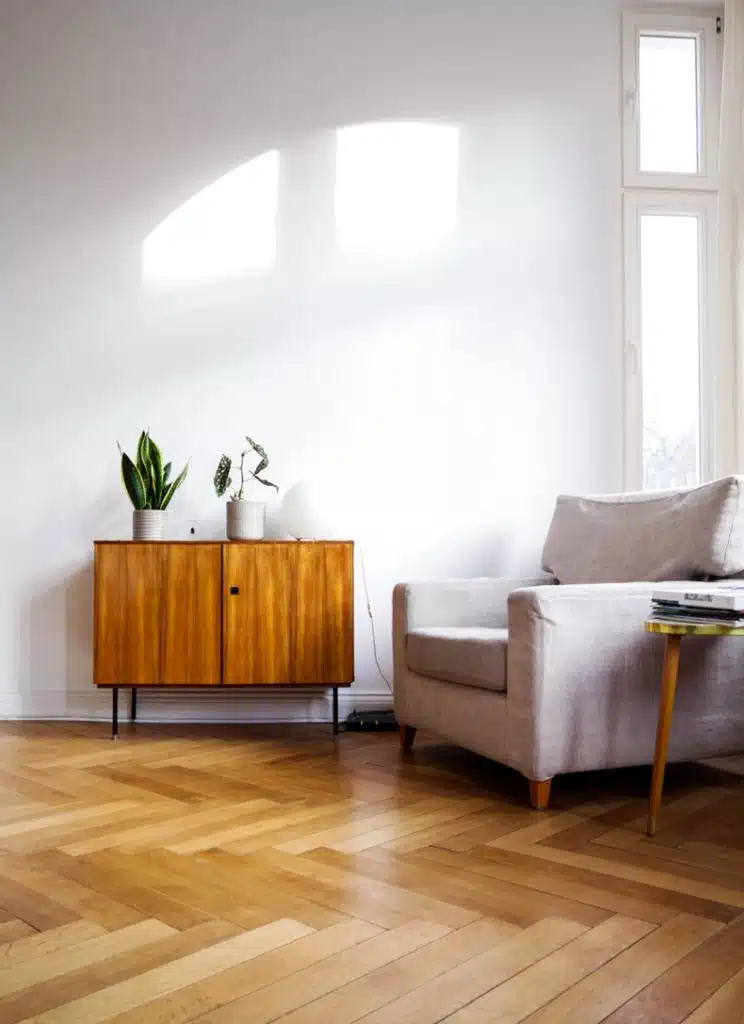
You can use table lamps, floor lamps, and overhead lighting to prevent this from happening. That way, you can adjust the lighting as necessary.
While bedroom lamps should be soft and dim, you can go for brighter lights in the living room. That will boost your mood and make you feel chatty and sociable.
5. Choose Feng Shui colors for your Living Room
We’ve covered the room shape, design, and lighting. Now, it’s time to think about your living room’s color palette – keeping feng shui in mind, of course!
Feng shui advises that colors will affect your mood, energy levels, and even your health. In a living room, you want soothing colors, but not so muted as the bedroom. You also want to invite creativity and sociability.
Plus, the colors should all come together in a cohesive and stylish way.
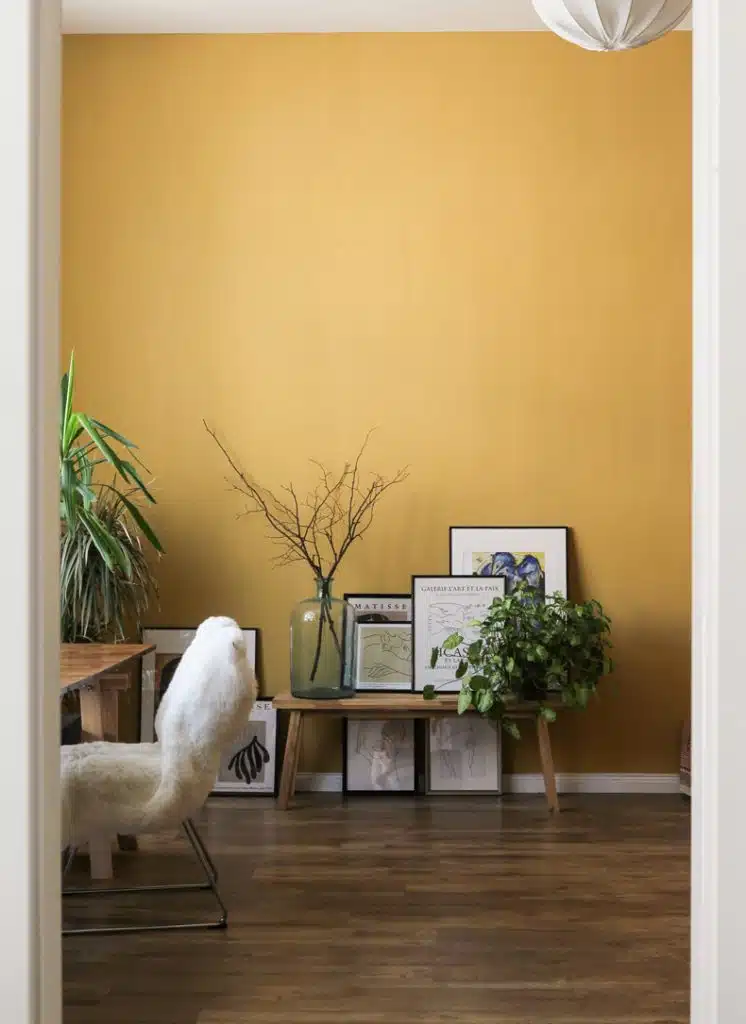
It’s best to opt for a lighter shade on your walls. Not only will it provide a backdrop for your room, but it will also make space feel lighter and brighter. You’ll maximize all that essential natural light!
The ideal colors for your walls are neutral shades such as beige, cream, or white. If you want to get creative, you could go for a pale yellow or light pink.
Then, you can add accent colors. For example, green or blue are excellent for inspiring both creativity and tranquility. Earthy shades of brown and grays also add variety.
But don’t mix too many different colors together. I recommend sticking to a simple color palette of two or three shades at most.
You might be tempted to throw in a bright accent item. But be wary; a color that’s too harsh can unbalance the room and undo all your careful work.
6. Where to place your Feng Shui Sofa?
Without a doubt, the sofa is the single most important item in your living room. It’s where people gather, chat, relax, and pass the time. It’s also likely the biggest item in your living room.
So, choosing where to place your sofa is a crucial decision. But follow this guidance, and you’ll know the best spot for it.
First of all, you should be able to see the door clearly from your sofa. That will make you feel relaxed and safe (even if you’re not aware of it).
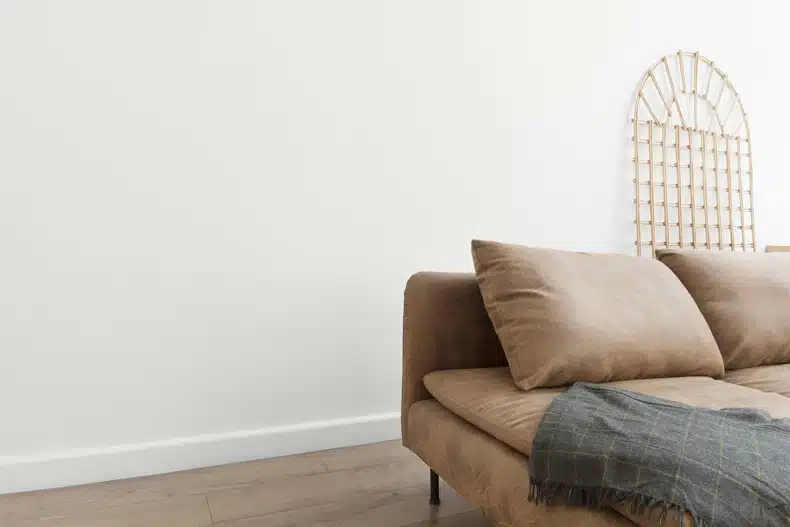
If you can’t see the door from where you’re sitting, you may find that you’re uneasy, without even knowing why. It’s built into us to be on the lookout for intruders or danger, so that clear view is essential.
The ideal place for your sofa is in the ‘command position.’ This feng shui name refers to a place against the wall and in clear sight of the door, but not directly opposite it.
Placing your sofa against the wall will make you feel more secure and supported.
Awkward spaces behind the sofa could gather negative energy or create hiding places.
You also don’t want people passing behind you while you’re on the sofa. It will leave you feeling jumpy and on edge.
If you can’t place your sofa against the wall, you can anchor it with heavy furniture instead. For example, you can place a cabinet or sturdy chairs behind the sofa. That prevents it from moving around or feeling like you’re floating in the middle of the room.
Ideally, your sofa should also sit in the area that has the highest ceiling. Avoid placing it under a beam, as it could collect negative energy. You may find yourself feeling squashed and repressed – which isn’t ideal when you want to relax and be sociable!
7. The Ideal Feng Shui furniture layout in your Living Room
Now you’ve got your sofa in place, it’s time to plan out the rest of your furniture. Your living room should look great but also have a practical design.
Remember that the aim is to allow energy to flow freely, so don’t pack everything in tightly. Make space for chi energy to flow – and for you to move between items!
You don’t need to fill every area of the room. There should be plenty of room to move about with ease, so don’t block the path between items.
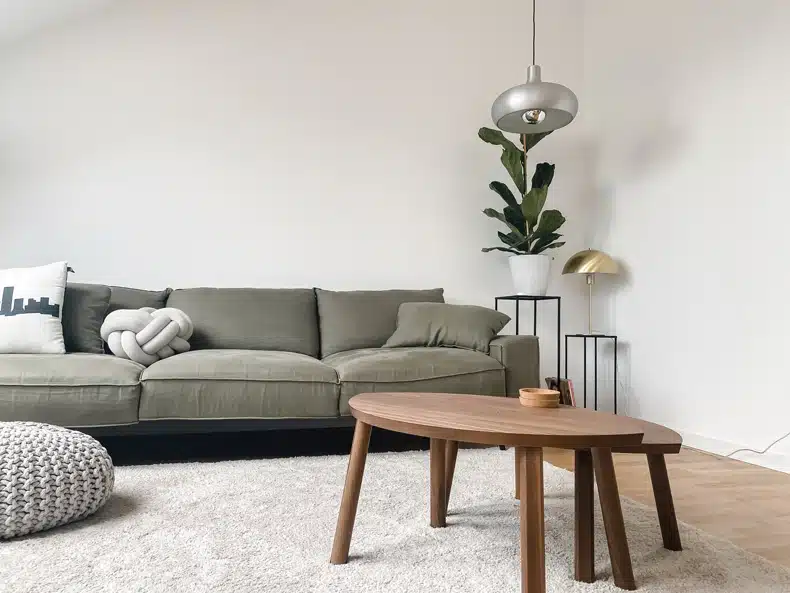
Just like with your sofa, larger items like fireplaces for instance are best placed against walls. That will prevent stagnant energy from gathering and let as much light in as possible. So, the room will feel fresh and airy.
Overall, the room should feel welcoming and comfortable. The layout needs to make sense, so be realistic when you plan out the layout.
Feng shui aims to bring balance into your room. You can do this in your living room by placing furniture symmetrically. It doesn’t need to be perfect, though!
But don’t have all the heavy furniture in one area of the room – spread it out. Have little areas of ‘white space’ throughout the room to balance out the furniture.
8. Choose Feng Shui Living Room furniture
As with the room design, feng shui prefers furniture with simple, regular shapes. Opt for square or rectangular furniture over funky, eclectic shapes. You’ll find that you feel more relaxed and comfortable if you do, as it creates a calming sense of security.
In feng shui, home design should be practical, and every piece of furniture should have a purpose. That’s why feng shui is so compatible with minimalist interior design.
The golden rule is only to keep what you need. Don’t have items just to fill space if you won’t use them.
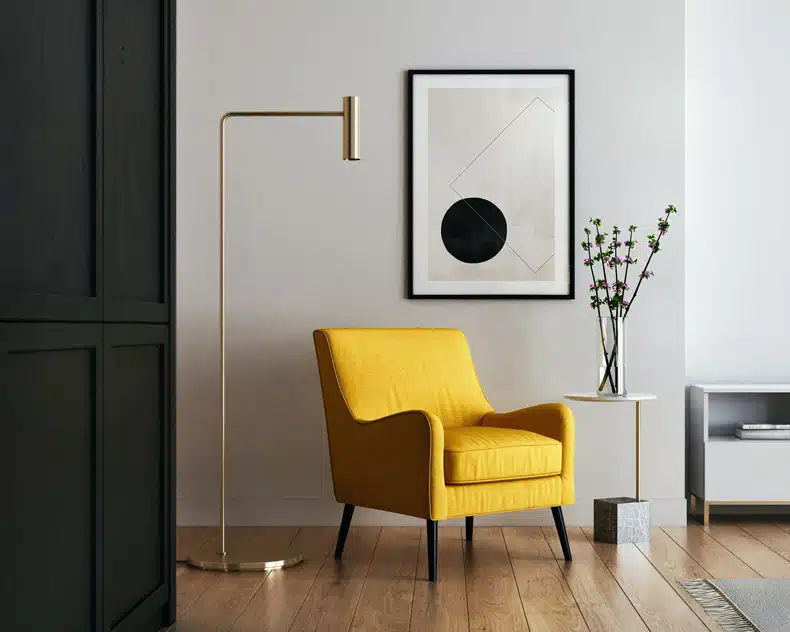
It’s even better if you go for multifunctional furniture. For example, you could go for a bench that doubles up as seating and storage all at once! A desk with shelving is also ideal.
As you pick furniture for your living room, keep in mind how the living room will look. You want the items to balance each other out and look in proportion with each other. It all needs to come together cohesively for a beautiful room.
You can play around with basic elements such as texture and colors to add some contrast. Adding an accent color or feature items keeps it interesting. But avoid anything that will unbalance the room too much!
9. Remove any clutter from the room
Feng shui is all about the smooth movement of energy through your home. As clutter will build up negative energy, it has no place in your feng shui living room.
Decluttering your home is an essential step in the feng shui process. While it can feel overwhelming, anyone can declutter a room.
I recommend dividing your room into small, achievable sections. Then, tackle them one at a time. If you want to find out more about decluttering, check out my detailed guide here.
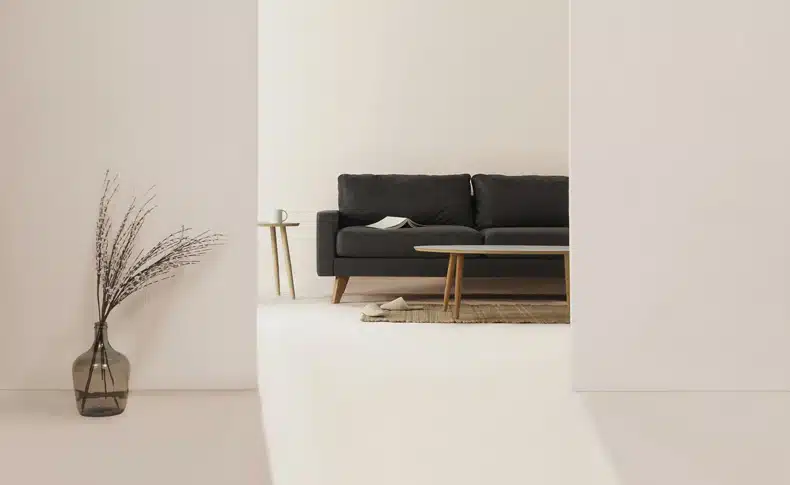
The basic rule to decluttering is that everything should have a purpose. Clutter has been proven to make you feel stressed, anxious, and disorganized. It will capture any bad energy and store it up for later. You don’t want that in your living room!
So, take some time to go through your items and decide what you need to keep. Then, make sure to organize it all!
Every item should have a home. Then, you’ll always know where to put things, and clutter won’t build up in the future. You can invest in clever storage that will keep your home clean and tidy.
10. Decorate with Feng Shui Living Room art
It’s time to add the final touches to your feng shui living room. Art can set the tone of the room and add some beauty. But it’s essential to choose the right kind of artwork for your living room.
You want art that will make you feel inspired, creative, and calm. Avoid art that provokes strong negative emotions, such as fear, anger, or discomfort. While all art has its place, it’s not in your living room!
According to feng shui, it’s best to avoid using mirrors for decoration, too. The reason is that it can amplify any negative energy already in the room.
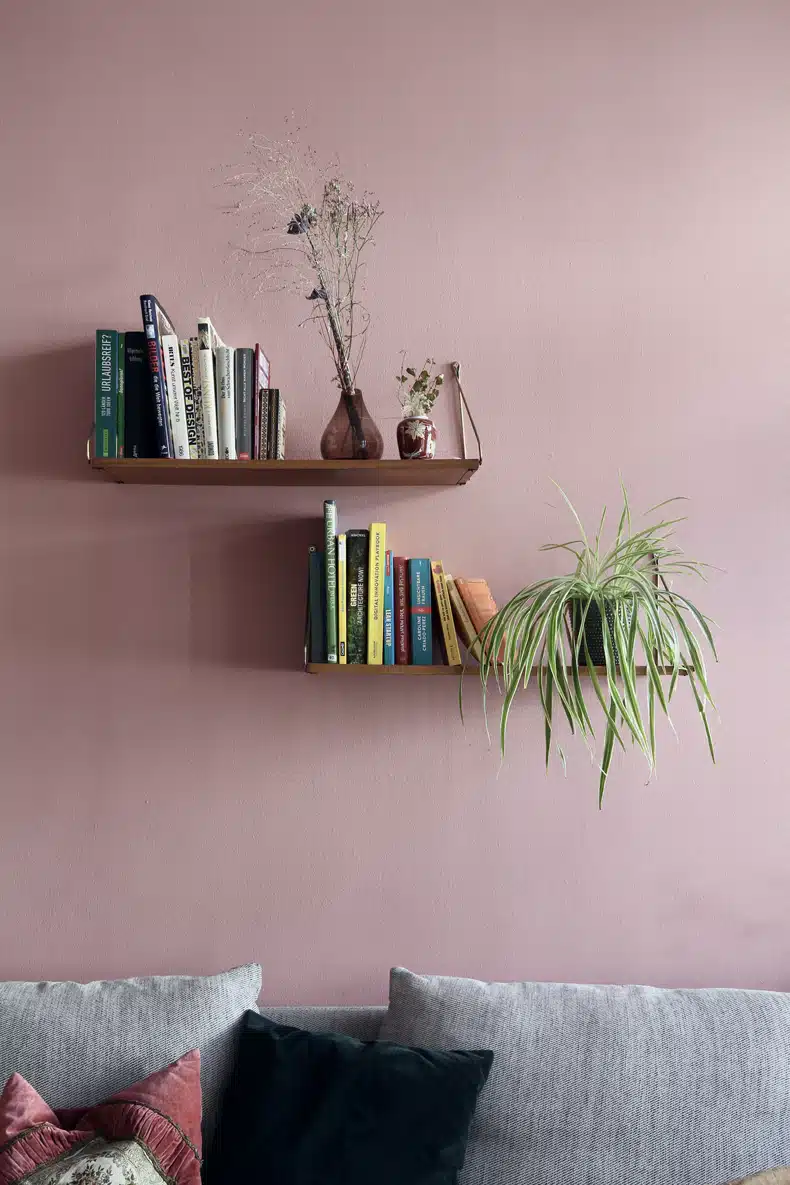
Nature-inspired art works wonders in a living room. It brings the beauty and serenity of nature into your home.
You can also go for an abstract piece you find beautiful. But most importantly, go for artwork that fits into or complements your color scheme.
The art you choose is up to you, so long as you follow these basic feng shui rules.
When it comes to placing the artwork, the best place is facing your sofa, so you have a clear view. Another alternative is to hang the artwork above the sofa.
11. Add Plants to boost energy (and even Wealth!)
You can also use plants to decorate and freshen up your room. While plants aren’t ideal in a feng shui bedroom, there’s no reason to avoid them in your living room.
Instead, they will make the living room feel lively, bright, and inviting. Not only do they purify the air, but they can also soak up any bad energy too.
You can go for small or large plants for your living room. A small plant is perfect on a side table, while larger plants can sit on the floor and add some variety and height.
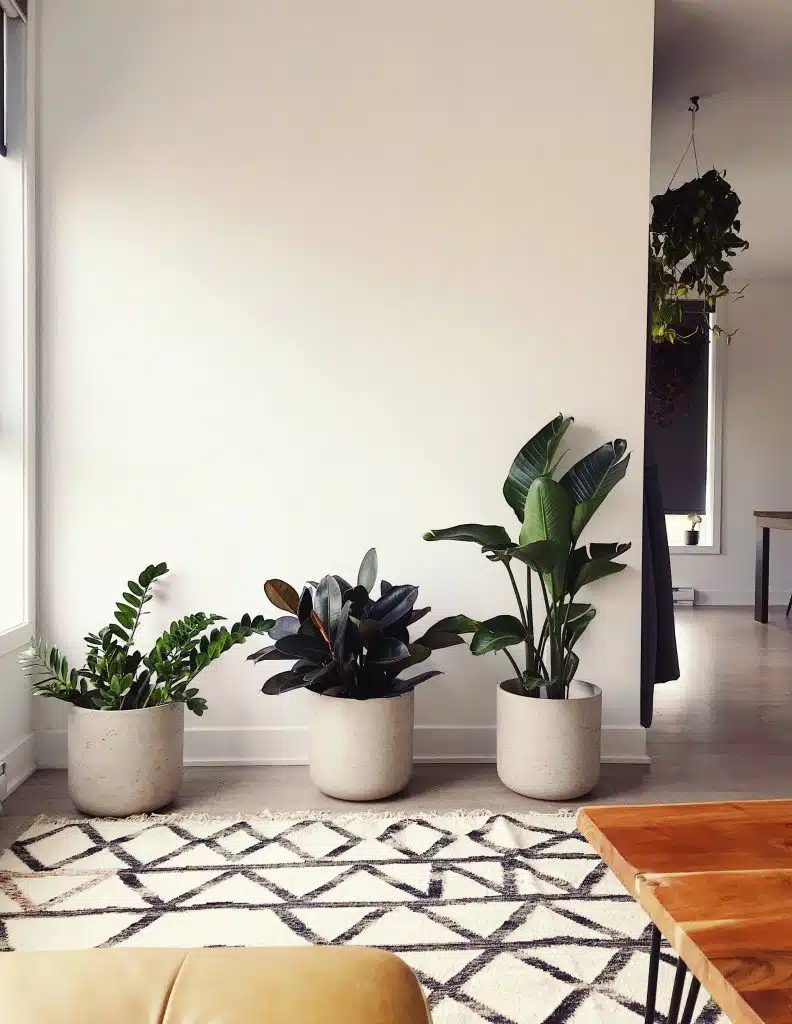
From a feng shui perspective, plants with large round leaves are preferable. These are associated with wealth and fortune!
Ancient Chinese wisdom also has advice for where to put plants in your living room. The recommended spots are in the southeast or northwest corners. So, grab a compass, and add a few potted plants to your room to add those final touches!
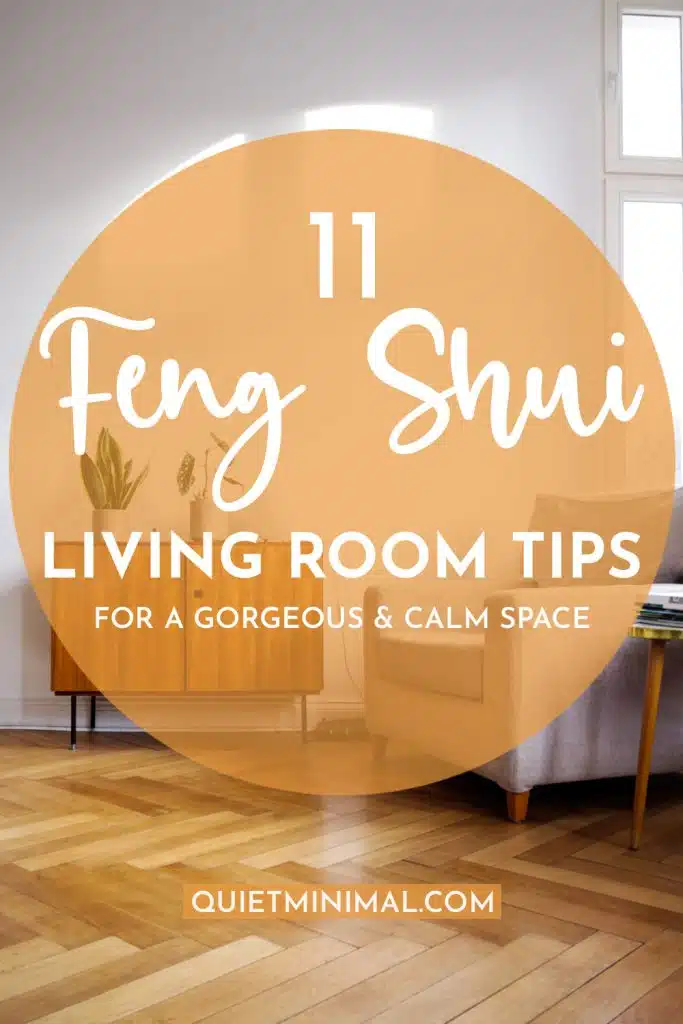
Tip: save the image above to your Pinterest to re-read this article later!
Final Thoughts
If you follow these simple yet effective tips, you’ll have a beautiful feng shui living room. It will be the hub of your home and a great space for entertaining guests or relaxing!
Let me know what you think of these feng shui tips in the comments below! Or share your advice or any questions you have.
Follow me on Pinterest for more interior home tips and inspiration!
